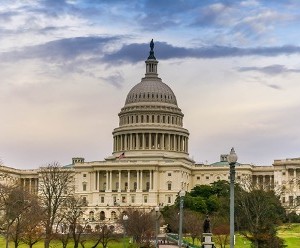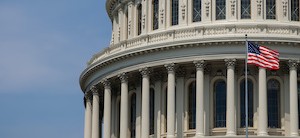Phase IV Relief Package
 House Democrats have introduced the phase IV relief package, entitled the HEROES Act, that delivers a total of $3 trillion dollars in economic assistance to address both the continuing public health crisis and the economic shortfalls resulting from the COVID-19 pandemic. The package expands on the provisions and policies of the CARES Act, that Congress passed in April, and establishes new avenues of funding assistance, such as the Heroes Fund, which provides $180 billion to provide financial support essential workers during the crisis, and a new $1.5 billion ratepayer assistance program for wastewater and drinking water utilities. The measure provides $875 billion in direct assistance to states and local governments hit hard by the crisis but does not extend assistance eligibility to special districts. The bill also remedies the eligibility exclusion of the public sector from receiving payroll tax credits for paid family and sick leave that were granted to the private sector, by deleting the exclusionary provision in the CARES Act. However, congressional Republicans have shown skepticism over the Democrats’ plan, noting that Congress recently passed extensive relief funding packages in the last two months. The House is expected to debate and vote on the package on Friday, May 15.
House Democrats have introduced the phase IV relief package, entitled the HEROES Act, that delivers a total of $3 trillion dollars in economic assistance to address both the continuing public health crisis and the economic shortfalls resulting from the COVID-19 pandemic. The package expands on the provisions and policies of the CARES Act, that Congress passed in April, and establishes new avenues of funding assistance, such as the Heroes Fund, which provides $180 billion to provide financial support essential workers during the crisis, and a new $1.5 billion ratepayer assistance program for wastewater and drinking water utilities. The measure provides $875 billion in direct assistance to states and local governments hit hard by the crisis but does not extend assistance eligibility to special districts. The bill also remedies the eligibility exclusion of the public sector from receiving payroll tax credits for paid family and sick leave that were granted to the private sector, by deleting the exclusionary provision in the CARES Act. However, congressional Republicans have shown skepticism over the Democrats’ plan, noting that Congress recently passed extensive relief funding packages in the last two months. The House is expected to debate and vote on the package on Friday, May 15.
Text of Phase IV Relief Package
Section-by-Section Summary of Phase IV Relief Package
Ratepayer Assistance Focus in Congress
 The phase IV relief package establishes a new $1.5 billion ratepayer assistance grants program to support low-income household needs. Under the program, the Department of Health and Human Services would provide grants to States, which the States would distribute to public drinking water and wastewater utilities to help offset revenue losses due to COVID-19 impacts.
The phase IV relief package establishes a new $1.5 billion ratepayer assistance grants program to support low-income household needs. Under the program, the Department of Health and Human Services would provide grants to States, which the States would distribute to public drinking water and wastewater utilities to help offset revenue losses due to COVID-19 impacts.
To be eligible to receive funding, utilities will have to ensure and maintain outreach activities, notifying ratepayers of available assistance and charge not more than the difference between actual cost of service and amount of assistance payment made by the State. Under this program, a utility receiving assistance is barred from disconnecting service due to nonpayment, charging late fees or fees accrued during the emergency period, and reconnections of service must be conducted so that health risks to the household receiving service are minimized. Consideration of this program and the Phase IV package by the House could occur on May 15.
Below is a summary of how the bill defines low-income households and how funding would be allocated to States under the program.
- States must enter into agreements with utilities to assist in identifying low-income households. Allotment would be made based upon:
- Percentage of households in a state with income equal or less than 150% of federal poverty line
- Percentage of such households that spend more than 30% of monthly income on housing
- Extent to which the jurisdiction impacted by COVID-19 compared with national average
- 10% of funds reserved to provide funding by Secretary to states based on economic disruptions from declared emergency
- Definition of low income household is:
- All households equal or less than 150% of federal poverty line and all households with income equal or less than 60% of state median income
- Other households may include those adversely impacted by job loss or severe income loss and households that are receiving assistance under SNAP, SSI, and payments under Veterans’ and Survivors’ Pension Act
Senate Committee Advances Water Legislation
![]() The Senate Committee on Environment and Public Works unanimously approved the America’s Water Infrastructure Act of 2020 (S. 3591) and Drinking Water Infrastructure Act of 2020 (S. 3590) by roll call votes of 21-0. The bills now go to the Senate floor for debate, but a date has not yet been scheduled.
The Senate Committee on Environment and Public Works unanimously approved the America’s Water Infrastructure Act of 2020 (S. 3591) and Drinking Water Infrastructure Act of 2020 (S. 3590) by roll call votes of 21-0. The bills now go to the Senate floor for debate, but a date has not yet been scheduled.
S.3591 provides a total of $17 billion in new federal authorizations to support U.S. Army Corps of Engineers projects and activities, and the U.S. Environmental Protection Agency’s municipal wastewater, stormwater, and other clean water infrastructure needs, including $3 billion for the State Revolving Fund. H.R. 3590 provides $2.5 billion to address the nation’s drinking water needs to support the SRF Program and PFAS cleanups.
Text of S. 3591 can be reviewed here.
Text of S. 3590 can be reviewed here.




 @CASA_CleanWater
@CASA_CleanWater